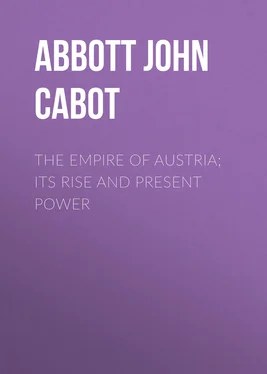John Abbott - The Empire of Austria; Its Rise and Present Power
Здесь есть возможность читать онлайн «John Abbott - The Empire of Austria; Its Rise and Present Power» — ознакомительный отрывок электронной книги совершенно бесплатно, а после прочтения отрывка купить полную версию. В некоторых случаях можно слушать аудио, скачать через торрент в формате fb2 и присутствует краткое содержание. Жанр: Путешествия и география, История, foreign_edu, foreign_antique, foreign_prose, на английском языке. Описание произведения, (предисловие) а так же отзывы посетителей доступны на портале библиотеки ЛибКат.
- Название:The Empire of Austria; Its Rise and Present Power
- Автор:
- Жанр:
- Год:неизвестен
- ISBN:нет данных
- Рейтинг книги:3 / 5. Голосов: 1
-
Избранное:Добавить в избранное
- Отзывы:
-
Ваша оценка:
- 60
- 1
- 2
- 3
- 4
- 5
The Empire of Austria; Its Rise and Present Power: краткое содержание, описание и аннотация
Предлагаем к чтению аннотацию, описание, краткое содержание или предисловие (зависит от того, что написал сам автор книги «The Empire of Austria; Its Rise and Present Power»). Если вы не нашли необходимую информацию о книге — напишите в комментариях, мы постараемся отыскать её.
The Empire of Austria; Its Rise and Present Power — читать онлайн ознакомительный отрывок
Ниже представлен текст книги, разбитый по страницам. Система сохранения места последней прочитанной страницы, позволяет с удобством читать онлайн бесплатно книгу «The Empire of Austria; Its Rise and Present Power», без необходимости каждый раз заново искать на чём Вы остановились. Поставьте закладку, и сможете в любой момент перейти на страницу, на которой закончили чтение.
Интервал:
Закладка:
The two rival emperors made vigorous preparations to settle the dispute with the sword, and the German States arrayed themselves, some on one side and some on the other. The two armies met at Gelheim on the 2d of July, led by the rival sovereigns. In the thickest of the fight Adolphus spurred his horse through the opposing ranks, bearing down all opposition, till he faced Albert, who was issuing orders and animating his troops by voice and gesture.
"Yield," shouted Adolphus, aiming a saber stroke at the head of his foe, "your life and your crown."
"Let God decide," Albert replied, as he parried the blow, and thrust his lance into the unprotected face of Adolphus. At that moment the horse of Adolphus fell, and he himself was instantly slain. Albert remained the decisive victor on this bloody field. The diet of electors was again summoned, and he was now chosen unanimously emperor. He was soon crowned with great splendor at Aix-la-Chapelle.
Still Albert sat on an uneasy throne. The pope, indignant that the electors should presume to depose one emperor and choose another without his consent, refused to confirm the election of Albert, and loudly inveighed him as the murderer of Adolphus. Albert, with characteristic impulsiveness, declared that he was emperor by choice of the electors and not by ratification of the pope, and defiantly spurned the opposition of the pontiff. Considering himself firmly seated on the throne, he refused to pay the bribes of tolls, privileges, territories, etc., which he had so freely offered to the electors. Thus exasperated, the electors, the pope, and the King of Bohemia, conspired to drive Albert from the throne. Their secret plans were so well laid, and they were so secure of success, that the Elector of Mentz tauntingly and boastingly said to Albert, "I need only sound my hunting-horn and a new emperor will appear."
Albert, however, succeeded by sagacity and energy, in dispelling this storm which for a time threatened his entire destruction. By making concessions to the pope, he finally won him to cordial friendship, and by the sword vanquishing some and intimidating others, he broke up the league. His most formidable foe was his brother-in-law, Wenceslaus, King of Bohemia. Albert's sister, Judith, the wife of Wenceslaus, had for some years prevented a rupture between them, but she now being dead, both monarchs decided to refer their difficulties to the arbitration of the sword. While their armies were marching, Wenceslaus was suddenly taken sick and died, in June, 1305. His son, but seventeen years of age, weak in body and in mind, at once yielded to all the demands of his imperial uncle. Hardly a year, however, had elapsed ere this young prince, Wenceslaus III., was assassinated, leaving no issue.
Albert immediately resolved to transfer the crown of Bohemia to his own family, and thus to annex the powerful kingdom of Bohemia to his own limited Austrian territories. Bohemia added to the Austrian provinces, would constitute quite a noble kingdom. The crown was considered elective, though in fact the eldest son was almost always chosen during the lifetime of his father. The death of Wenceslaus, childless, opened the throne to other claimants. No one could more imperiously demand the scepter than Albert. He did demand it for his son Rhodolph in tones which were heard and obeyed. The States assembled at Prague on the 1st of April, 1306. Albert, surrounded by a magnificent retinue, conducted his son to Prague, and to confirm his authority married him to the widow of Wenceslaus, a second wife. Rhodolph also, about a year before, had buried Blanche, his first wife. Albert was exceedingly elated, for the acquisition of Bohemia was an accession to the power of his family which doubled their territory, and more than doubled their wealth and resources.
A mild government would have conciliated the Bohemians, but such a course was not consonant with the character of the imperious and despotic Albert. He urged his son to measures of arbitrary power which exasperated the nobles, and led to a speedy revolt against his authority. Rhodolph and the nobles were soon in the field with their contending armies, when Rhodolph suddenly died from the fatigues of the camp, aged but twenty-two years, having held the throne of Bohemia less than a year.
Albert, grievously disappointed, now demanded that his second son, Frederic, should receive the crown. As soon as his name was mentioned to the States, the assembly with great unanimity exclaimed, "We will not again have an Austrian king." This led to a tumult. Swords were drawn, and two of the partisans of Albert were slain. Henry, Duke of Carinthia, was then almost unanimously chosen king. But the haughty Albert was not to be thus easily thwarted in his plans. He declared that his son Frederic was King of Bohemia, and raising an army, he exerted all the influence and military power which his position as emperor gave him, to enforce his claim.
But affairs in Switzerland for a season arrested the attention of Albert, and diverted his armies from the invasion of Bohemia. Switzerland was then divided into small sovereignties, of various names, there being no less than fifty counts, one hundred and fifty barons, and one thousand noble families. Both Rhodolph and Albert had greatly increased, by annexation, the territory and the power of the house of Hapsburg. By purchase, intimidation, war, and diplomacy, Albert had for some time been making such rapid encroachments, that a general insurrection was secretly planned to resist his power. All Switzerland seemed to unite as with one accord. Albert was rejoiced at this insurrection, for, confident of superior power, he doubted not his ability speedily to quell it, and it would afford him the most favorable pretext for still greater aggrandizement. Albert hastened to his domain at Hapsburg, where he was assassinated by conspirators led by his own nephew, whom he was defrauding of his estates.
Frederic and Leopold, the two oldest surviving sons of Albert, avenged their father's death by pursuing the conspirators until they all suffered the penalty of their crimes. With ferocity characteristic of the age, they punished mercilessly the families and adherents of the assassins. Their castles were demolished, their estates confiscated, their domestics and men at arms massacred, and their wives and children driven out into the world to beg or to starve. Sixty-three of the retainers of Lord Balne, one of the conspirators, though entirely innocent of the crime, and solemnly protesting their unconsciousness of any plot, were beheaded in one day. Though but four persons took part in the assassination, and it was not known that any others were implicated in the deed, it is estimated that more than a thousand persons suffered death through the fury of the avengers. Agnes, one of the daughters of Albert, endeavored with her own hands to strangle the infant child of the Lord of Eschenback, when the soldiers, moved by its piteous cries, with difficulty rescued it from her hands.
Elizabeth, the widow of Albert, with her implacable fanatic daughter Agnes, erected a magnificent convent on the spot at Königsburg, where the emperor was assassinated, and there in cloistered gloom they passed the remainder of their lives. It was an age of superstition, and yet there were some who comprehended and appreciated the pure morality of the gospel of Christ.
"Woman," said an aged hermit to Agnes, "God is not served by shedding innocent blood, and by rearing convents from the plunder of families. He is served by compassion only, and by the forgiveness of injuries."
Frederic, Albert's oldest son, now assumed the government of the Austrian provinces. From his uncommon personal attractions he was called Frederic the Handsome. His character was in conformity with his person, for to the most chivalrous bravery he added the most feminine amiability and mildness. He was a candidate for the imperial throne, and would probably have been elected but for the unpopularity of his despotic father. The diet met, and on the 27th of November, 1308, the choice fell unanimously upon Henry, Count of Luxemburg.
Читать дальшеИнтервал:
Закладка:
Похожие книги на «The Empire of Austria; Its Rise and Present Power»
Представляем Вашему вниманию похожие книги на «The Empire of Austria; Its Rise and Present Power» списком для выбора. Мы отобрали схожую по названию и смыслу литературу в надежде предоставить читателям больше вариантов отыскать новые, интересные, ещё непрочитанные произведения.
Обсуждение, отзывы о книге «The Empire of Austria; Its Rise and Present Power» и просто собственные мнения читателей. Оставьте ваши комментарии, напишите, что Вы думаете о произведении, его смысле или главных героях. Укажите что конкретно понравилось, а что нет, и почему Вы так считаете.










